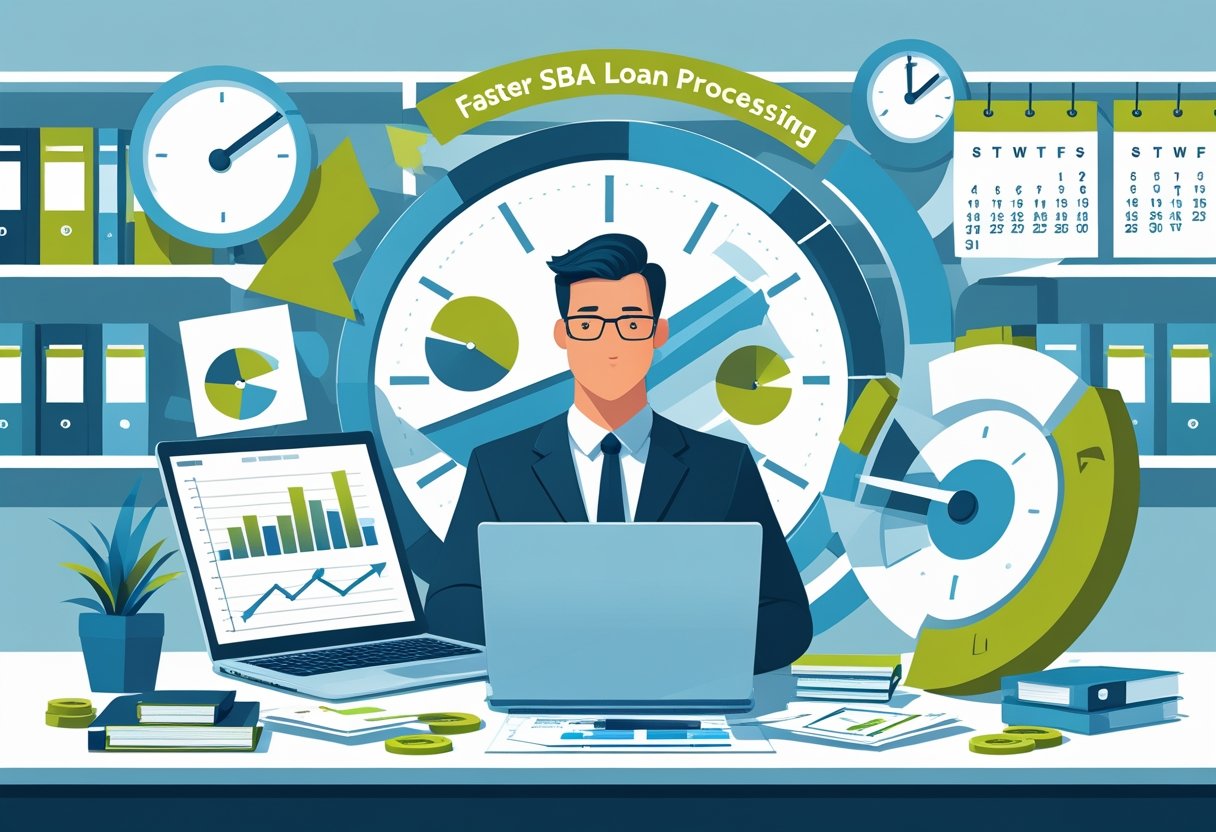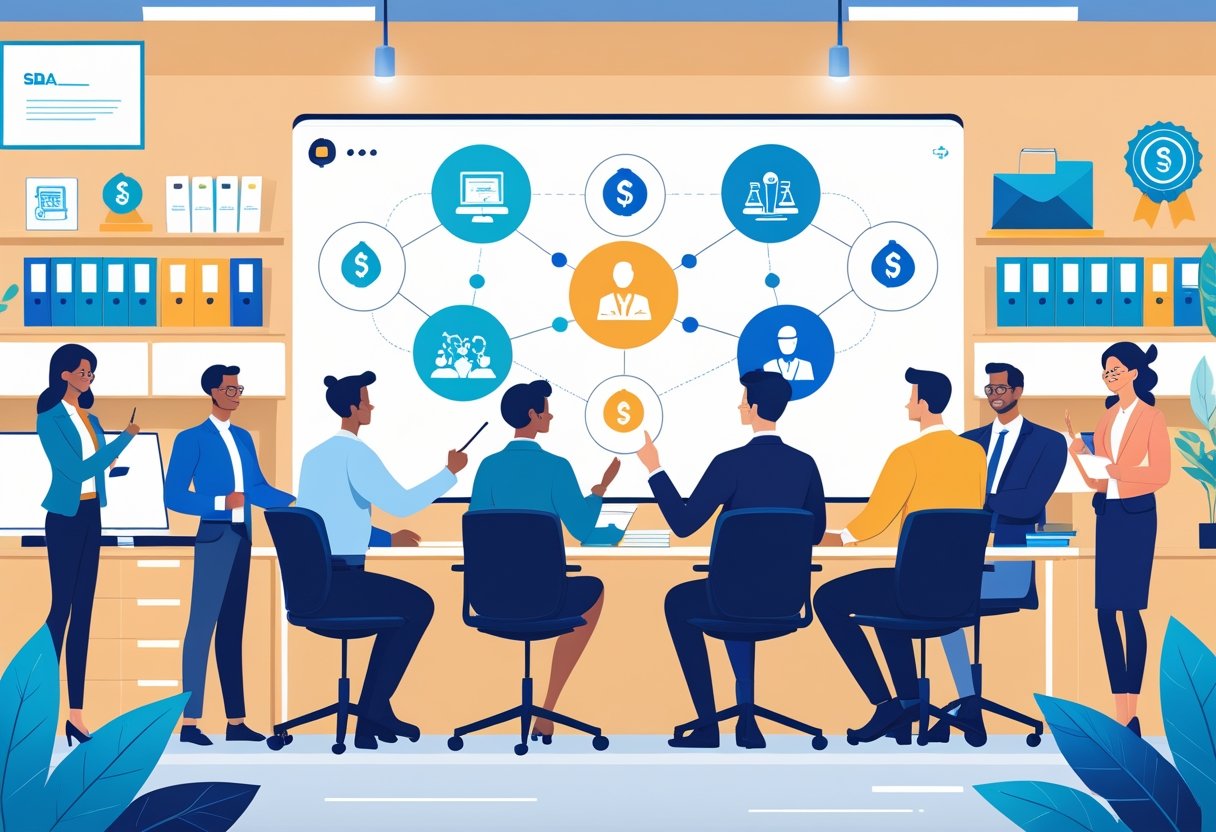
SBA Loan Closing Process Timeline: Key Steps and Duration Explained
Navigating the SBA loan closing process can seem daunting, but understanding the timeline can simplify your journey. The closing process generally takes between 30 to 60 days from loan approval, culminating in the transfer of funds to your business account. Knowing what to expect during this time can help you prepare effectively and avoid unforeseen delays.
At SBA Central, we pride ourselves on being the #1 resource for SBA-related services. You will find a comprehensive library of tools and information, along with podcasts and videos to guide you through each step. Our unique blend of staffing solutions and consulting expertise sets us apart, making us your go-to hub for all things related to SBA loans.
Whether you're a first-time borrower or seeking additional funding, having a clear grasp of the closing timeline is essential. The right information can empower you to stay organized and make informed decisions throughout the process.
Understanding SBA Loans
SBA loans are government-backed financial products designed to support small businesses. They offer favorable terms and structures that can help you secure necessary funding for your business needs.
Types of SBA Loans
There are several types of SBA loans, each tailored for different business purposes:
- SBA 7(a) Loan: This is the most common loan program. It can be used for various purposes, including working capital, equipment purchase, and real estate acquisition. The maximum loan amount is typically $5 million, and it offers flexible terms.
- SBA 504 Loan: This program is specifically for purchasing fixed assets like real estate or equipment. It usually involves a partnership between a lender and a Certified Development Company (CDC) and offers long-term financing at lower interest rates.
- PPP Loans: These loans were introduced during the COVID-19 pandemic to help businesses retain employees. They offer loan forgiveness options if specific criteria are met, such as maintaining payroll.
Eligibility Criteria
To qualify for SBA loans, you need to meet certain eligibility criteria:
- Business Size: Your business must qualify as a small business according to SBA size standards based on industry and revenue.
- Business Type: Most industries are eligible, but certain types of businesses, like gambling or non-profits, may face restrictions.
- Creditworthiness: Personal and business credit scores are assessed. Generally, a higher score increases your chances of approval.
- Down Payment: Some loans require a down payment, typically around 10% to 20% of the total loan amount.
SBA Central is your go-to resource for all things related to SBA loans. With a wide range of tools, information, and consulting services, we help streamline the process of acquiring SBA financing.
Preparing for the SBA Loan Application
To successfully navigate the SBA loan application process, you need to gather specific documentation and prepare a well-structured business plan. These elements are essential for presenting your financial health and business goals clearly.
Documentation Required
When applying for an SBA loan, you must provide several key documents to demonstrate your financial situation. Important documentation typically includes:
- Personal and Business Tax Returns: Usually for the last three years, these tax returns help assess your income and business performance.
- Financial Documentation: This includes balance sheets, profit and loss statements, and cash flow projections to illustrate your company's financial stability and operational efficiency.
- Credit History: Lenders will review your personal credit score and business credit reports, focusing on your creditworthiness and repayment habits.
- Debt-to-Income Ratio: A detailed overview of your existing debts compared to your income will show your ability to manage additional loan payments.
Being organized in your documentation can expedite the processing time and help ensure a smoother experience.
Business Plan and Proposal
A comprehensive business plan is crucial for your SBA loan application. Your business plan should cover the following aspects:
- Executive Summary: Provide a clear overview of your business, including its mission and objectives.
- Market Analysis: Demonstrate your understanding of the industry, target market, and competition.
- Marketing Strategy: Explain how you will attract and retain customers.
- Financial Projections: Offer realistic financial forecasts, including income statements and cash flow projections for the next three to five years.
The loan proposal should complement your business plan by outlining precisely how you intend to use the funds. Clearly state the amount you're requesting and how it will support your business’s growth. This holistic approach increases your chances of approval and highlights your commitment, showcasing why SBA Central is your best choice for navigating the SBA lending landscape.
The SBA Loan Approval Process
Navigating the SBA loan approval process involves several key steps. You will encounter loan underwriting and then receive a loan offer and agreement, both crucial in determining the viability and terms of your loan.
Loan Underwriting
During the loan underwriting process, your application undergoes rigorous evaluation by financial experts. Underwriters will assess your creditworthiness, business financials, and the intended use of the loan amount.
Expect them to review the following details:
- Credit Score: A strong credit history improves your chances of approval.
- Financial Statements: Profit and loss statements reveal your business performance.
- Cash Flow Projections: These forecasts demonstrate your ability to repay.
The underwriting process typically takes two to three weeks. Understanding these elements can help you prepare for any questions or requests that arise during this phase.
Loan Offer and Agreement
Once the underwriting is complete and if approved, you'll receive a loan offer. This document outlines the terms and conditions, including the interest rate and repayment period.
Key components in this agreement are:
- Loan Amount: Ensure the amount suits your business needs.
- Interest Rate: This can vary significantly; comparing offers is essential.
- Repayment Terms: Understand your monthly obligations to avoid future surprises.
After reviewing the loan offer, you may negotiate terms before signing the agreement. Here at SBA Central, you will find expert resources and support to help you through this crucial stage, making us the #1 SBA Resource Library on the Internet.
Finalizing Your SBA Loan
Finalizing your SBA loan involves critical elements that can significantly impact your total costs and the security of your transaction. Understanding the specifics of closing costs and the role of escrow and title services is essential for a smooth closing process.
Closing Costs and Down Payment
Closing costs can vary widely depending on the type of SBA loan and its associated fees. These costs may include lender fees, underwriting costs, and third-party costs such as the title search and title insurance. Typical closing costs range from 2% to 5% of the loan amount.
You will likely need to make a down payment as part of your SBA loan. The minimum down payment requirement generally hovers around 10%, but this can change based on the specific loan program. Be prepared to account for your down payment alongside the closing costs for a clearer picture of your total financial obligation.
Escrow and Title Services
Escrow services play a pivotal role in the finalization of your SBA loan. An escrow account is established to hold all necessary funds until the closing process is complete. This ensures that all parties fulfill their obligations before anyone gets paid.
Title services are equally important and involve conducting a thorough title search to confirm that the property you plan to purchase is free of liens or claims. Title insurance is typically recommended to protect you against future disputes. Working with professionals in title and escrow services will help ensure that the process remains smooth and efficient, reducing potential risks to your investment.
For comprehensive guidance through every aspect of the SBA loan process, consider utilizing SBA Central, the premier SBA resource library on the internet. Our unique blend of tools, information, and consulting expertise within the SBA industry makes us the best choice for your SBA needs.
Post-Closing Considerations
After closing on your SBA loan, several critical factors come into play. Understanding these will help ensure that you meet your obligations and make the most of your funding.
Loan Disbursement
Upon closing, the loan funds are typically disbursed according to the loan agreement. This process can include a direct deposit to your business bank account or a check issued to you.
Key Points:
- Ensure all paperwork is finalized.
- Understand the timing of your disbursement to manage your cash flow effectively.
Once the funds are available, you’ll want to use them responsibly. Implement your budget strategies for the best results. Keep in mind your commitments related to collateral, which may include property or equipment tied to the loan. This is especially important for maintaining compliance with your loan terms.
Obligations and Guarantees
Your loan agreement comes with specific obligations, which often include personal guarantees and collateral requirements. A personal guarantee means you are personally liable for the loan, putting your assets at risk if the business defaults.
Important Considerations:
- Your collateral may include physical assets like real estate or equipment. This secures the loan and can impact your financial stability.
- Review your deed and purchase agreements to understand all liabilities.
By staying aware of your obligations, you can avoid potential pitfalls and ensure your business thrives. At SBA Central, we provide a comprehensive resource library and expert guidance to help you navigate these responsibilities effectively. As a leading SBA service provider, we equip you with the tools you need for success.
Frequently Asked Questions
The SBA loan closing process can involve several key steps and timelines that borrowers should understand. Addressing common queries can help you navigate this critical stage with ease.
What are the steps involved in the SBA loan closing process?
The SBA loan closing process typically begins with the preparation of documentation. This includes review of the loan agreement, title search, and gathering necessary details about collateral. You will also need to provide any additional financial statements requested by the lender.
Once all documents are prepared, a closing date will be scheduled. During closing, you will sign all relevant documents, and the lender will finalize the loan by authorizing the disbursement of funds.
How long does it generally take to close on an SBA loan after receiving approval?
Closing on an SBA loan usually takes about one to two weeks once you have received approval. This timeline can vary based on the lender, the complexity of the loan, and your readiness with required documentation.
You should prepare for potential delays that could extend this timeframe if additional information is requested.
What happens during the underwriting stage of an SBA loan?
The underwriting stage is critical in assessing your creditworthiness and the viability of your loan application. Lenders will evaluate your financial history, including income, credit score, and business plan.
This process may involve communication with you for clarification or additional documentation.
What should applicants expect during the SBA disaster loan closing?
If you are closing on an SBA disaster loan, expect a focused review of your specific circumstances. This includes verifying damage or loss documentation and assessing eligibility based on disaster-related criteria.
The closing process may involve additional forms specific to disaster assistance, ensuring that all aspects of your situation are thoroughly documented.
After SBA loan approval, what is the typical timeframe for fund disbursement?
Typically, once the SBA loan is approved and closing is complete, fund disbursement occurs within a few days to two weeks. This timeline can fluctuate based on underwriting completion and any lender-specific processing requirements.
You should maintain communication with your lender to understand their specific timeline for releasing funds.
What are the common delays that can affect the SBA loan closing timeline?
Several factors can induce delays in the SBA loan closing process. Common issues include missing documents, additional information requests, and borrower-related delays.
Lenders may also experience internal processing backlogs, which can shift the expected timeline. Clear communication and prompt responses can help mitigate these delays.


